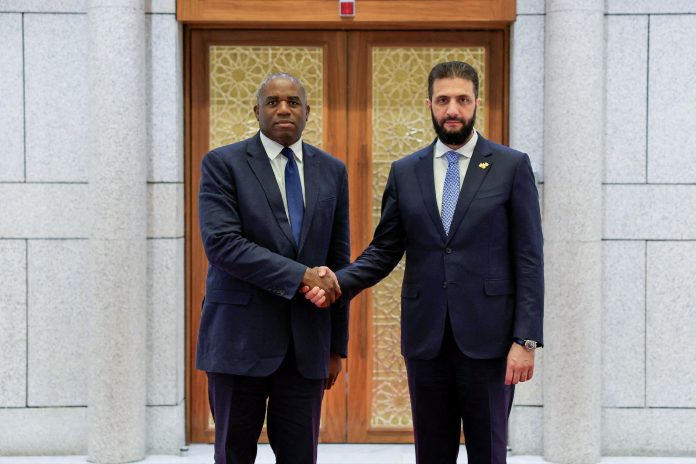British Foreign Secretary David Lammy visited Damascus on Saturday, meeting with Syria’s interim President Ahmad al-Sharaa in a move that marks the re-establishment of diplomatic relations after 14 years of strained ties during Syria’s conflict and the Assad family’s leadership.
The visit comes amid Syria’s efforts to rebuild international relations, particularly with Western countries, following the fall of former President Bashar al-Assad in December. Assad was ousted during an offensive led by al-Sharaa’s Hayat Tahrir al-Sham group.
According to a statement from the Syrian presidency, the discussions between Lammy and al-Sharaa focused on bilateral relations, prospects for enhanced cooperation, and recent developments in the region and internationally. Lammy also held talks with Syria’s Foreign Minister, Asaad al-Shibani, as reported by state media.
UK pledges support for Syria’s recovery
The UK’s Foreign Office described the visit as an expression of Britain’s support for Syria’s new administration as it embarks on efforts to rebuild the economy, pursue an inclusive political transition, and address justice for victims of the previous regime.
The British government announced a new funding package aimed at supporting Syria’s recovery. This includes assistance for the dismantling of chemical weapons stockpiles from the Assad era, as well as humanitarian relief to address urgent needs. The initiative also aims to enhance UK and regional security and tackle irregular migration.
The Foreign Office emphasised the UK’s continued commitment to preventing any resurgence of the so-called Islamic State (IS), which previously controlled significant areas in Syria and Iraq. IS lost its final territorial stronghold in Syria in March 2019.
Saturday’s announcement included a new £94.5 million package (approximately $129 million), which will provide emergency humanitarian support, contribute to long-term recovery through education and employment initiatives, and offer assistance to countries in the region hosting Syrian refugees.
International sanctions eased to aid reconstruction
In a related move, the UK lifted sanctions in April on a number of Syrian organisations, including governmental departments and media institutions, to support post-conflict reconstruction. This followed an earlier decision to remove sanctions on over 20 Syrian entities, primarily banks and oil companies.
Separately, US President Donald Trump recently signed an executive order lifting several economic sanctions on Syria, fulfilling a pledge made to President al-Sharaa.
Syria’s new leadership continues to face considerable challenges in rebuilding the nation’s economy and infrastructure after nearly 14 years of civil war, which has resulted in an estimated 500,000 deaths. In recent months, President al-Sharaa has undertaken diplomatic visits, including to energy-rich countries in the region and to France in May — his first visit to a European Union member state.
Talks in Lebanon address border security
Also on Saturday, Mr Lammy travelled to Beirut for a meeting with Lebanese President Joseph Aoun. Their discussions included the situation along the Lebanon-Israel border following the 14-month conflict between Israel and Hezbollah.
A statement from President Aoun’s office indicated that Lebanon plans to deploy 10,000 troops along its southern border, with only the Lebanese army and UN peacekeeping forces operating in the area.
